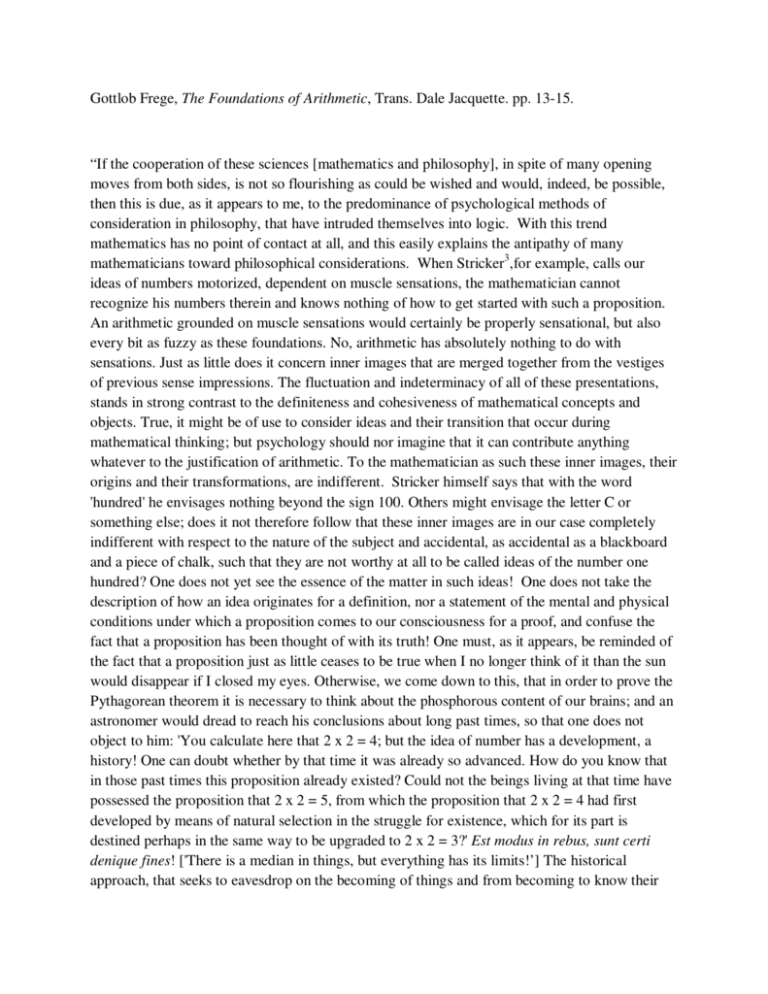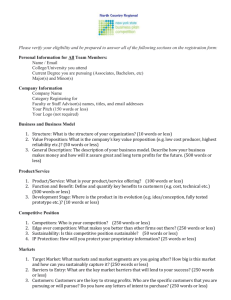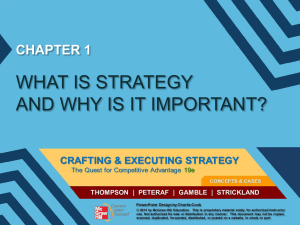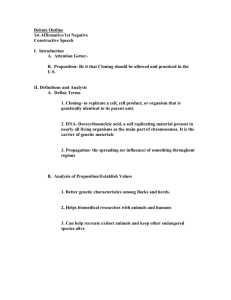Gottlob Frege, The Foundations of Arithmetic, Trans. Dale Jacquette
advertisement

Gottlob Frege, The Foundations of Arithmetic, Trans. Dale Jacquette. pp. 13-15. “If the cooperation of these sciences [mathematics and philosophy], in spite of many opening moves from both sides, is not so flourishing as could be wished and would, indeed, be possible, then this is due, as it appears to me, to the predominance of psychological methods of consideration in philosophy, that have intruded themselves into logic. With this trend mathematics has no point of contact at all, and this easily explains the antipathy of many mathematicians toward philosophical considerations. When Stricker3,for example, calls our ideas of numbers motorized, dependent on muscle sensations, the mathematician cannot recognize his numbers therein and knows nothing of how to get started with such a proposition. An arithmetic grounded on muscle sensations would certainly be properly sensational, but also every bit as fuzzy as these foundations. No, arithmetic has absolutely nothing to do with sensations. Just as little does it concern inner images that are merged together from the vestiges of previous sense impressions. The fluctuation and indeterminacy of all of these presentations, stands in strong contrast to the definiteness and cohesiveness of mathematical concepts and objects. True, it might be of use to consider ideas and their transition that occur during mathematical thinking; but psychology should nor imagine that it can contribute anything whatever to the justification of arithmetic. To the mathematician as such these inner images, their origins and their transformations, are indifferent. Stricker himself says that with the word 'hundred' he envisages nothing beyond the sign 100. Others might envisage the letter C or something else; does it not therefore follow that these inner images are in our case completely indifferent with respect to the nature of the subject and accidental, as accidental as a blackboard and a piece of chalk, such that they are not worthy at all to be called ideas of the number one hundred? One does not yet see the essence of the matter in such ideas! One does not take the description of how an idea originates for a definition, nor a statement of the mental and physical conditions under which a proposition comes to our consciousness for a proof, and confuse the fact that a proposition has been thought of with its truth! One must, as it appears, be reminded of the fact that a proposition just as little ceases to be true when I no longer think of it than the sun would disappear if I closed my eyes. Otherwise, we come down to this, that in order to prove the Pythagorean theorem it is necessary to think about the phosphorous content of our brains; and an astronomer would dread to reach his conclusions about long past times, so that one does not object to him: 'You calculate here that 2 x 2 = 4; but the idea of number has a development, a history! One can doubt whether by that time it was already so advanced. How do you know that in those past times this proposition already existed? Could not the beings living at that time have possessed the proposition that 2 x 2 = 5, from which the proposition that 2 x 2 = 4 had first developed by means of natural selection in the struggle for existence, which for its part is destined perhaps in the same way to be upgraded to 2 x 2 = 3?' Est modus in rebus, sunt certi denique fines! ['There is a median in things, but everything has its limits!’] The historical approach, that seeks to eavesdrop on the becoming of things and from becoming to know their essence, certainly carries great authority; but it has also its limitations. If in the existing flux of all things there is nothing fixed, eternity persists, then the knowability of the world would end and everything would plummet into confusion. One thinks, as it appears, that concepts in the individual mind emerge like the leaves on trees, and believes that their nature could be recognized from this, that one explores and seeks to define their emergence psychologically from the nature of the human mind. But this conception pushes everything into the subjective, and if pursued to the end, annihilates truth. What one calls the history of concepts is rather either a history of our knowledge of concepts or of the meanings of words. Through great intellectual labor that can continue over centuries there is often success first in recognizing a concept in its purity in peeling away the foreign wrappings that conceal it from the mind's eyes. What should one now say, if someone advances, in place of this work where it appears not yet completed, disrespecting it as nothing, and goes to the nursery, or relegates himself to the oldest contrivable level of human development, there to discover, like John Stuart Mill, say a gingerbread or pebble arithmetic! It only remains then to ascribe to the flavor of the cake a special meaning for the concept of number. This is indeed the exact opposite of a rational procedure, and, in any case, as non-mathematical as possible. No wonder that the mathematicians want to know nothing of it! Instead of finding there a special purity of the concept, where one believes their source to lie near, one sees everything blurry and indistinct as through a haze. It is as if everyone who wished to be acquainted with America wanted to put himself back in the position of Columbus, when he caught sight of the first doubtful glimmer of his presumed India. Of course, such a comparison proves nothing; but hopefully it clarifies my position. It can indeed be that the history of the discoveries in many cases is useful as a preparation for further researches; but it must not try to take their place.” One must, as it appears, be reminded of the fact that a proposition just as little ceases to be true when I no longer think of it than the sun would disappear if I closed my eyes. Otherwise, we come down to this, that in order to prove the Pythagorean theorem it is necessary to think about the phosphorous content of our brains; and an astronomer would dread to reach his conclusions about long past times, so that one does not object to him: 'You calculate here that 2 x 2 = 4; but the idea of number has a development, a history! One can doubt whether by that time it was already so advanced. How do you know that in those past times this proposition already existed? Could not the beings living at that time have possessed the proposition that 2 x 2 = 5, from which the proposition that 2 x 2 = 4 had first developed by means of natural selection in the struggle for existence, which for its part is destined perhaps in the same way to be upgraded to 2 x 2 = 3?'






